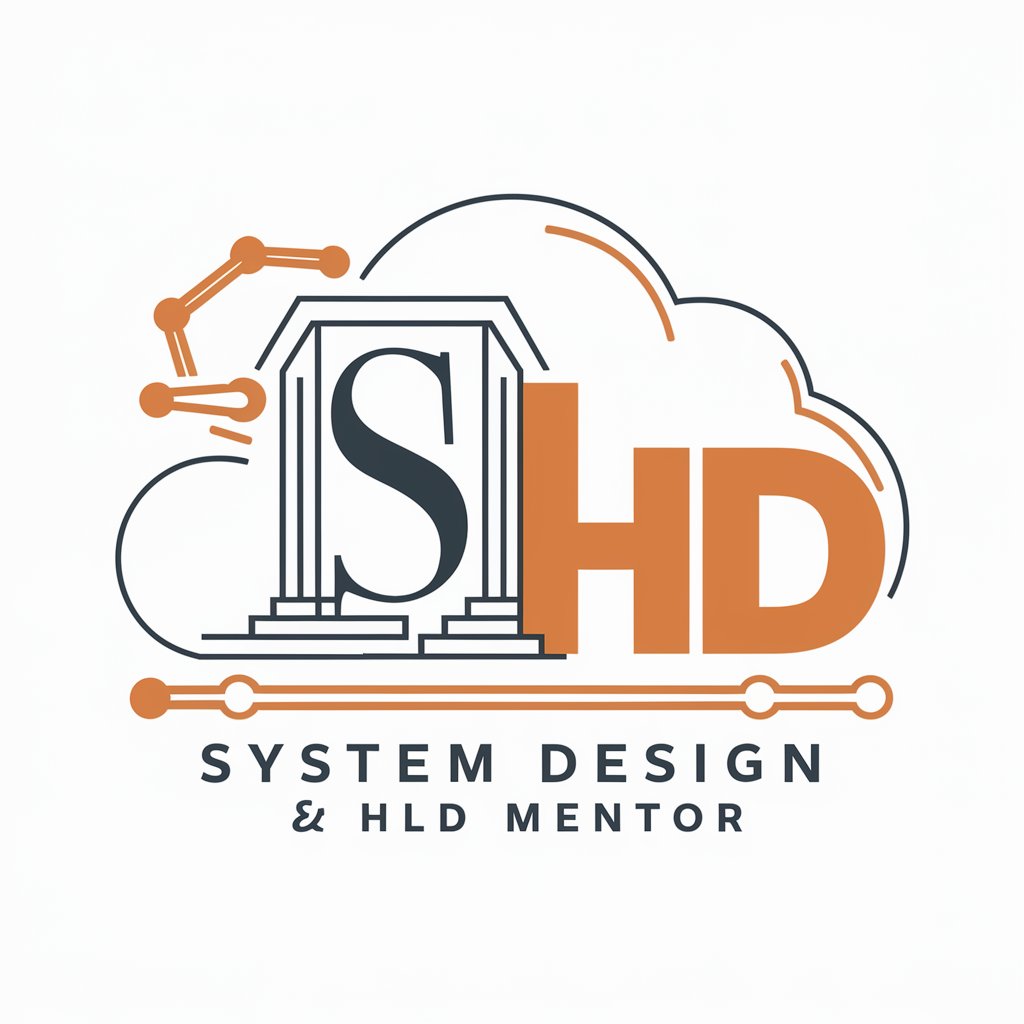System Design HLD Mentor - System Design Guidance

Welcome to System Design HLD Mentor!
AI-powered System Design Expertise
Explain the trade-offs between consistency and availability in distributed systems.
Describe how Kafka can be used to build a real-time data pipeline.
What are the key components of a microservices architecture?
How does Redis achieve high performance and low latency?
Get Embed Code
Introduction to System Design HLD Mentor
The System Design HLD Mentor is a specialized entity designed to guide and assist in the high-level design (HLD) phase of system architecture. Its primary purpose is to offer expertise in conceptualizing and planning the structure of software systems, focusing on defining the system's components, their interactions, and the data flow between them. This mentorship covers distributed systems, cloud architectures, and technologies such as Kafka and Redis, addressing trade-offs in latency, consistency, availability, and partition tolerance. An example scenario where System Design HLD Mentor proves invaluable includes designing a scalable, distributed messaging system for real-time data processing, where it would advise on the choice of messaging protocol, data partitioning strategy, and system fault tolerance. Powered by ChatGPT-4o。

Main Functions Offered by System Design HLD Mentor
Discussing Functional and Nonfunctional Requirements
Example
Evaluating requirements for a cloud-based e-commerce platform
Scenario
The mentor aids in identifying key requirements like handling peak traffic loads, ensuring data consistency across distributed databases, and implementing user authentication and data encryption.
Defining Services and Their Interactions
Example
Designing a microservices architecture for a video streaming service
Scenario
It involves specifying services such as user management, video processing, and content delivery, detailing their RESTful APIs, and designing the interaction flow, including asynchronous messaging for video processing tasks.
Trade-off Analysis
Example
Choosing between consistency models in a distributed database
Scenario
The mentor guides through the trade-offs between strong consistency and eventual consistency models, considering factors like network latency, data volume, and user experience, for a global social media application.
Technology Selection
Example
Selecting a data storage solution
Scenario
Advising on choosing between SQL and NoSQL databases for a financial analytics system, considering the data structure, scalability needs, and query performance.
Ideal Users of System Design HLD Mentor Services
Software Architects and Engineers
Professionals involved in the planning and development of software systems. They benefit from the mentor's expertise in making architectural decisions, selecting appropriate technologies, and designing scalable and resilient systems.
Product Managers
Individuals responsible for defining product requirements and roadmaps. They utilize the mentor to understand technical constraints and opportunities, ensuring product features align with system capabilities and performance goals.
Technical Leaders and Decision-Makers
CTOs, team leads, and project managers overseeing the development process. They rely on the mentor for insights on architectural practices, cost-effective technology choices, and strategies to mitigate risks in system design.
Students and Educators in Computer Science
Learners and instructors seeking deeper understanding and practical knowledge in system design principles. The mentor serves as a valuable educational tool, bridging theoretical concepts with real-world application scenarios.

How to Use System Design HLD Mentor
Step 1
Start with a free trial at yeschat.ai, accessible without needing to sign up or subscribe to ChatGPT Plus, allowing you to explore its features immediately.
Step 2
Identify your system design needs, whether you're working on a specific project, preparing for an interview, or seeking to expand your knowledge in high-level design.
Step 3
Utilize the provided templates and guides to frame your system design queries. This can range from architecture diagrams to specific technologies like Kafka, Redis, or cloud solutions.
Step 4
Interact with the tool by asking detailed questions or presenting scenarios you're working on. Use the feedback to refine your understanding and designs.
Step 5
Leverage the mentor's insights for optimizations, identifying trade-offs, and understanding best practices in distributed systems and cloud architecture for a comprehensive system design approach.
Try other advanced and practical GPTs
Marketing Expert
Empowering marketing with AI-driven insights

Omraam Mikhael Aivanhov
Empowering spiritual growth with AI.

Project Manager Pro
Optimizing projects with AI-driven insights.

tech_blogger
Streamline your technical blogging with AI-powered insights.

Calisthenics Coach
Empowering your fitness journey with AI.

Resume Matchmaker
Elevate Your Resume with AI-Powered Insights

Happy Hour - Cocktail GPT
Craft cocktails with AI-powered flair

psy_parent_positiv
Empowering parenting with AI support

AbogAI | Derecho Propiedad Intelectual Industrial
Navigate Spanish IP Law with AI

Interactive AI Agent
Empowering interactions with AI intelligence

Solar Follow Up
Empowering solar decisions with AI

Türkiye İmar Uzmanı
Navigating Türkiye's Urban Laws, AI-Powered

Detailed Q&A about System Design HLD Mentor
What makes System Design HLD Mentor unique in helping with system design?
The tool specializes in high-level system design, offering insights into architectural decisions, trade-offs in technology selection, and detailed guidance on distributed systems, cloud architectures, and essential technologies like Kafka and Redis.
Can System Design HLD Mentor assist with designing a scalable distributed system?
Yes, it provides expert advice on creating scalable and resilient distributed systems, covering aspects like data partitioning, load balancing, fault tolerance, and consistency models, ensuring your system can efficiently handle growth.
How does the mentor handle security considerations in system design?
It emphasizes security from the outset, advising on best practices for securing distributed systems, including encryption, authentication, authorization, and secure communication protocols, to protect against vulnerabilities.
Can this tool help in choosing the right database and caching strategies for my application?
Absolutely. It guides on selecting the appropriate database system (SQL, NoSQL) based on your application's needs and advises on effective caching strategies to enhance performance and reduce latency.
Is System Design HLD Mentor suitable for beginners in system design?
Yes, it is designed to be accessible for learners at all levels. For beginners, it offers foundational knowledge and gradually delves into more complex concepts, making complex system design principles understandable and engaging.
